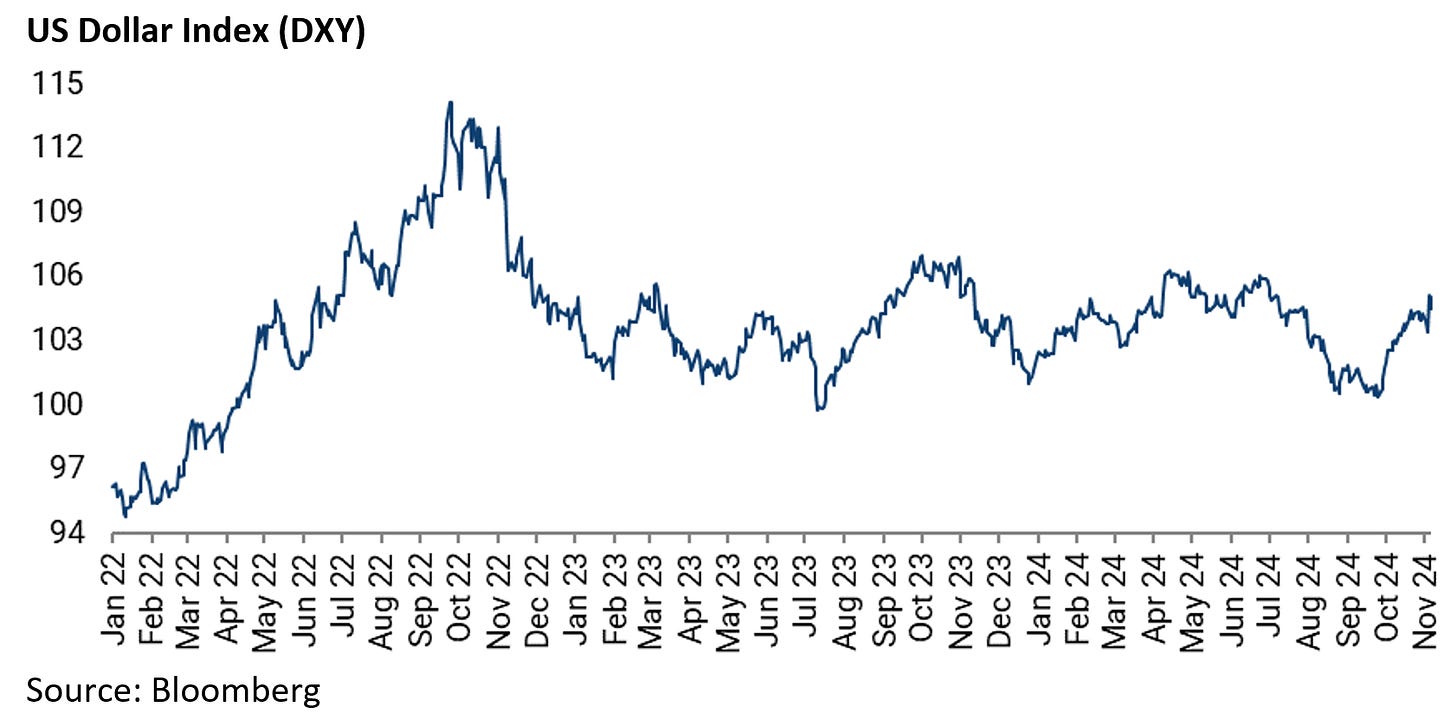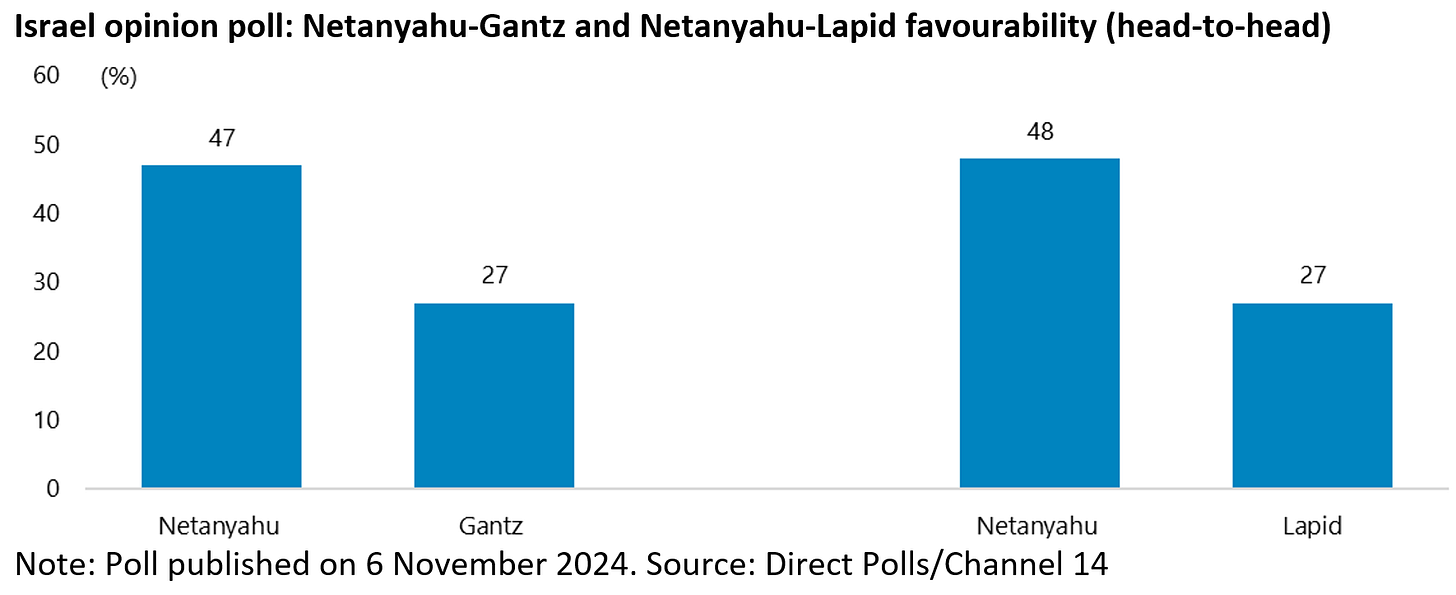Will Trump End Conflict in Europe and the Middle East?
Author: Chris Wood
It has all been about the US presidential election of late with the initial market reaction to Donald Trump’s victory what this writer would have expected; namely the US dollar is up, the stock market is up and the Treasury bond market is down.
The case for remaining bearish on Treasury bonds is straightforward to this writer.
As for the dollar, the 47th president-elect’s policy agenda is long-term bearish for the dollar even though the initial pro-growth orientation will be viewed as dollar positive.
As for the stock market, if the short-term is positive in terms of the expectation of tax cuts extended and a deregulatory wave as animal spirits are unleashed, the risk for equities is clearly that at some point the stock market will not be able to ignore rising bond yields.
Trump Likely to Decrease Political Uncertainty
Meanwhile Trump’s arrival on the scene creates the potential for dramatic changes as regards what has been the greatest risk to markets of late, namely geopolitics.
Israeli Prime Minister Benjamin Netanyahu has in the months prior to the election taken advantage of an effective power vacuum in Washington to advance his government’s agenda in a highly effective way and in a manner which is seemingly fast changing the balance of power in the Middle East.
The flattening of Gaza and the loss of the Hezbollah leadership are historic developments but they have nothing to do with “two-state solutions”.
All this happened while the Biden administration has continued to call for cease fires while providing the Israeli Government with continuing funding.
This is as dramatic example of the tail wagging the dog as this writer has ever seen.
Meanwhile, Iran was finally provoked into a response, which seems to have been the aim of the Israeli Prime Minister all along.
The growing confidence of Netanyahu is clear from his public call to the Iran people on 30 September to abandon the Islamic regime in place since 1979 and re-ally with Israel (see Politico article: “Netanyahu: Iran regime change will come a ‘lot sooner than people think’”, 30 September 2024).
On this point, it is worth recalling that the Israeli Prime Minister hosted in April 2023 the 63-year-old son of the former Shah of Iran, Reza Pahlavi (see The Times of Israel article: “Son of last Iranian shah to visit Israel in bid to renew ‘ancient bond’”, 17 April 2023).
It is also no surprise to hear that Netanyahu’s popularity has soared, which is likely to give him further confidence to continue on his current path.
A poll published on 6 November for Channel 14 shows that Netanyahu now has much higher ratings than his two main rivals.
In head-to-head matchups, he leads former general Benny Gantz in favourability 47% to 27% and opposition leader Yair Lapid 48% to 27%.
Still, while Israel has refrained so far from further dramatic escalation against Iran, in terms of attacking its oil facilities for example, the risk for markets is that Israel attacks again in a more direct provocative fashion; and that the Iranian leadership finally decides to respond in a more telling way, say by closing the Strait of Hormuz or attacking US military facilities in the Gulf.
On that point, Iran has stated that should the country‘s oil infrastructure be attacked it would consider attacking America’s military bases in the region.
These are clearly developments which financial markets could not ignore.
None of this is the base case but it is certainly not impossible.
Meanwhile, exactly where Trump stands on the Middle East issue is unclear.
Still, he is extremely unlikely to prove as passive as the Biden administration has been in spite of 11 trips to the region by Secretary of State Antony Blinken since events on 7 October last year.
Ukraine Back from the Brink, For Now...
Meanwhile in the final weeks prior to the election Joe Biden has pulled back from the brink in the Russian-Ukraine conflict, in terms of not authorizing Ukraine to employ US, British and French supplied long-range missiles for use deep inside Russia.
That is a relief since Moscow has made it clear that such an authorization would be interpreted as a signal by Moscow that NATO had entered the war directly on Russian soil, risking further escalation that could even turn nuclear.
The Western mainstream media has also in the recent past finally started reporting what has been clear for many months.
That is that Ukraine is losing the war.
For an example, see Financial Times article (“Ukraine faces its darkest hour”, 1 October 2024).
The same article also reported on Ukrainian President Volodymyr Zelenskyy’s increasingly desperate but failed efforts in a trip to Washington both to get permission to use Western missiles for long-range strikes into Russia and to try and achieve concrete progress on Ukraine’s hopes to join NATO.
This trip included an impromptu 40-minute meeting with Donald Trump in Trump Tower.
The interchange does not appear to have changed the Republican presidential candidate’s mind on the Ukraine issue.
Still, this is a reminder that Trump’s victory means there is now a much better chance of resolving the other of the two key simmering geopolitical risks, namely Russian-Ukraine.
This has also been a reason for Vladimir Putin not to escalate the conflict ahead of the US presidential poll beyond the slow but steady progress being made by his forces advancing West.
The other reason for the Russian president to seek to avoid near-term escalation was the BRICS Summit held in Kazan, Russia, on 22-24 October which Putin and nine member countries attended.
It should be remembered that the UAE formally joined the BRICS group on 1 January, along with Egypt, Ethiopia and Iran, but Saudi Arabia did not even though it was formally invited to in August 2023.
Still Saudi Foreign Minister Prince Faisal bin Farhan Al Saud attended the summit as an invited guest even though Crown Prince Mohammed bin Salman did not.
As for Trump’s view on current goings on in the Middle East, he has always been solidly pro-Israel.
Still, he does not like wars and he is intrinsically unpredictable.
This is a further reason for Netanyahu to have used the recent power vacuum in Washington to advance his agenda as much as possible.
Meanwhile, in an outright confrontation between Israel and Iran, the Israeli leader’s calculation will be that America will join in openly on Israel’s side.






Wow, this aged poorly.
Biden has now authorized long range strikes into Russia, and before that Russia had been rapidly escalating with North Korean troops in Kursk and possibly the largest missile barrage against civilian targets of the war so far. Nothing suggests that withholding strike permission was holding back Putin in any way and now that permission was granted, there is no response from Russia, nor a market freakout. Without Biden admin "escalation management", this war would have already been won, but as usual the critical decisions come years too late.
Also, the "anti-war" candidate Trump is trying to assemble a cabinet of pro-Israel war hawks and he has already betrayed his promise to end the Ukraine conflict within 24 hours of becoming the president elect. Surprise, surprise, his supporters got played. Who could have guessed the compulsive liar lied, huh?